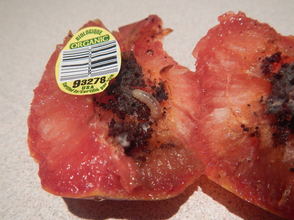
Normally the pesticide would have killed this little critter, but this was an organic plum, and pesticides are not allowed in organic farming. Now, no one wants to bite into a plum to find a worm, however. But on the bright side, I know that the farm that produced this plum was probably in compliance with the organic regulations.
There was no way that I could tell that this plum had a worm in it because this particular critter will burrow its way through the stem opening so that the entry way is just not visible on the outside, but the inside is completely inedible. The critter is called the plum sawfly. "In spring the sawfly emerges from the soil and lays eggs on the blossom of plum trees. When the plums begin to develop the little caterpillars eat their way into the center of the plum and feed off it as the plum develops.
Plum Sawfly is difficult to control using organic methods, the only one being available is a pheromone trap but it really only traps a few of them.
The chemical deltamethrin sprayed when the blossom is falling off will definitely help control sawfly." To that fact, I must ask, "Do I want to also ingest this chemical?"
But I hear you ask, "why bother with purchasing organic products anyway? They are just more expensive, and there might be worms in them." True, but here are some facts that I have learned from Hawthorn University when it comes to organic foods:
Conventional crops are grown with conventional synthetic fertilizer, which contains three nutrients - phosphorous, potassium and nitrogen. Farmers use this because it makes the plants dark green, they have stronger stalks, and it gives the appearance of being healthier. But what about so many other nutrients that we need besides the three in the synthetic fertilizers? Crop rotation is usually not implemented either, and so the soil used to raise these crops is really deplete of so many nutrients. The plant cannot draw up the nutrients into the food unless the nutrients are in the soil to begin with.
By contrast, organic farmers cannot use conventional synthetic fertilizers, but they must use organic rich soil, full of many nutrients, and they also usually implement crop rotation, both of which impart a greater quantity of nutrients in the foods. Remember, if the nutrients are present in the soil, then the nutrients can be pulled up into the plants. Many studies have proven that organic foods contain greater quantities of nutrients than conventionally grown foods. Find out about one such study over a 2 year period from the Journal of Applied Nutrition posted on Organic Consumers Association which says that the organically grown food averaged 63% higher in calcium, 78% higher in chromium, 73% higher in iron, 118% higher in magnesium, 178% higher in molybednum, 91% higher in phosphorous, 125% higher in potassium and 60% higher in zinc.
Here is a good short read from "Eating Well" on the mechanism by which organic foods contain more nutrients.
Sadly, our farming techniques have focused on producing pest resistant higher yields more rapidly, and nutrient richness has been put on the back burner.
So what is it - no worm with less nutrient, or the occasional worm with more nutrients?
Sources:
http://www.organicconsumers.org/Organic/organicstudy.cfm
http://www.gardenfocused.co.uk/fruitarticles/plums/pest-disease.php





